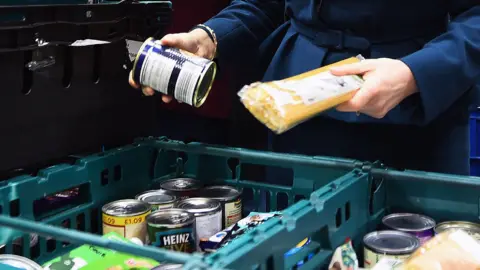[ad_1]
 PA Media
PA MediaMore than half of Londoners who do not earn a “real living wage” have had to resort to using a food bank in the last year, according to new research.
The Living Wage Foundation (LWF) commissioned the survey for its annual report looking at what life is like for the 574,000 Londoners who are paid less than £13.15 an hour – which they say is the capital’s real living wage.
According to polling by Survation, 23% of the capital’s lowest-paid workers go to a food bank once a week or more, with a further 28% said they had visited at least once in the last year.
In response to the report, a government spokesperson said mass dependence on foodbanks was “unacceptable” and it was “changing the rules to put more money in working people’s pockets”.
The survey found that 36% of those earning less than the “real living wage” had “skipped meals regularly for financial reasons” in the last year and 45% say that they are worse off than they were a year ago.
More than two-thirds of the lowest paid in London said that earning less than the real living wage was worsening their anxiety levels, 66% said it was affecting their quality of sleep, and 57% said it was impacting their physical health.
The London “real living wage” rate is calculated for the LWF by the Resolution Foundation as the minimum amount needed to meet the cost of living in London, based on a basket of household goods and services.
It differs from the government’s National Living Wage, the minimum legal hourly rate of pay for those aged 21 and over, currently set at £11.44 across the UK.
Those aged between 18 and 21 are entitled to the lower rate of £8.60 an hour.
‘Fair day’s pay’
Emily Hodgson, head of partnership and campaigns at the LWF, said: “As inflation eases, it’s important to remember that low-paid Londoners continue to face the brunt of persistent high prices.
“Our findings today highlight the detrimental impact this continues to have on their mental and physical health.
“We’re grateful to the 4,001 London employers who continue to demonstrate their commitment to providing a real living wage to their workers, ensuring they are paid enough to meet their everyday needs.”
A government spokesperson said in response to the LWF’s latest report: “The mass dependence on food banks is unacceptable, which is why we are changing the rules to put more money in working people’s pockets, including younger workers.
“We have been clear that we need to consider the impact on businesses, the employment prospects of young people and the impact on the wider economy, which is what we have instructed the Low Pay Commission to do.
“We believe a hard day’s work deserves a fair day’s pay and by working in conjunction with business, that’s exactly what our Make Work Pay plans will do.”
[ad_2]
Source link




